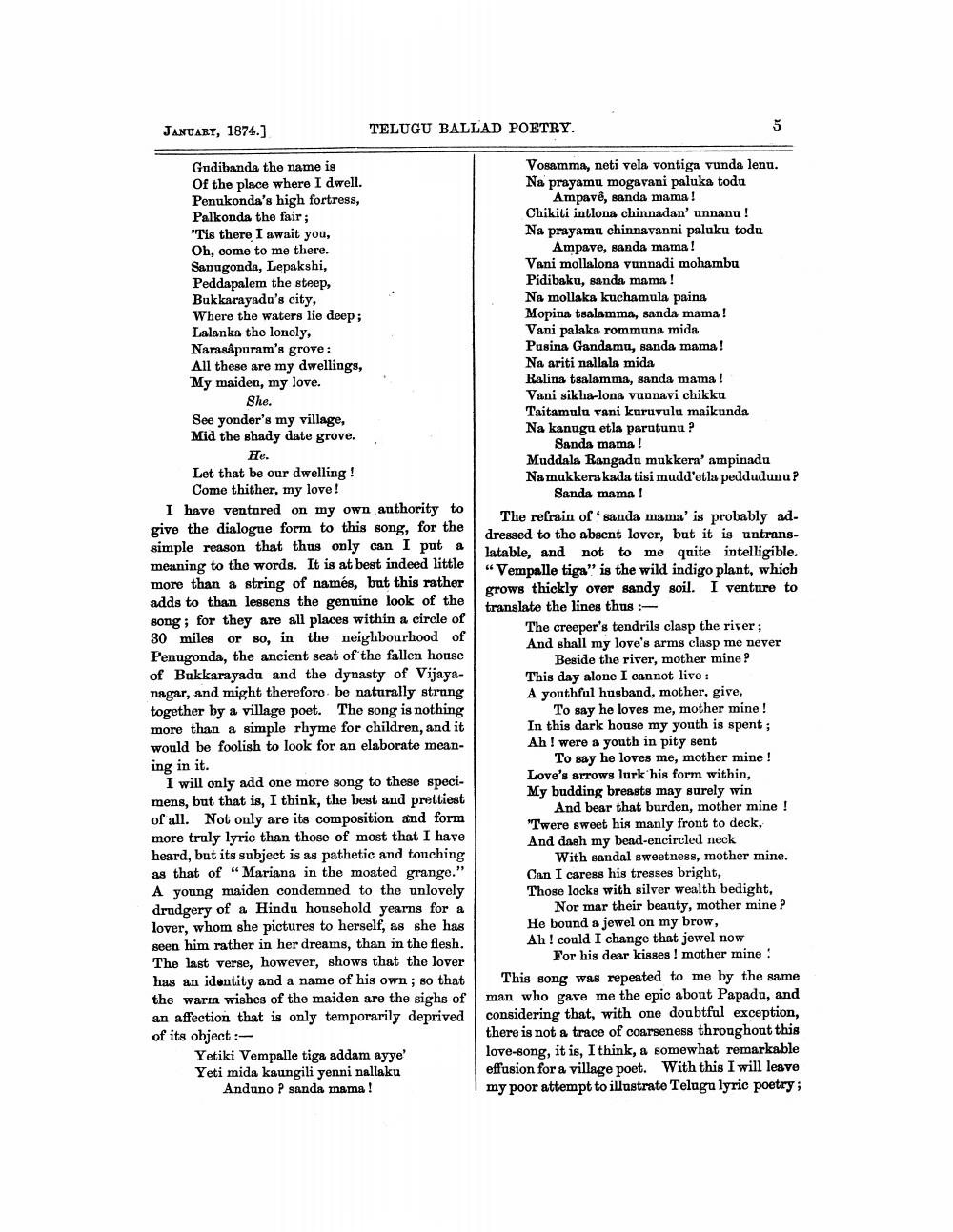________________
JANUARY, 1874.)
TELUGU BALLAD POETRY.
He.
Gudibanda the name is
Vosamma, neti vela vontiga vunda lenu. Of the place where I dwell.
Na prayamu mogavani paluka todu Penukonda's high fortress,
Ampavê, sanda mama! Palkonda the fair;
Chikiti intlona chinnadan' unnanu! "Tis there I await you,
Na prayamu chinnavanni paluku todu Oh, come to me there.
Ampave, sanda mama! Sanugonda, Lepakshi,
Vani mollalona vunnadi mohambu Peddapalem the steep,
Pidibaku, sanda mama! Bukkarayada's city,
Na mollaka kuchamula paina Where the waters lie deep;
Mopina tsalamma, sanda mama! Lalanka the lonely,
Vani palaka rommuna mida Narasapuram's grove:
Pusina Gandamu, Banda mama! All these are my dwellings,
Na ariti nallala mida My maiden, my love.
Ralina tsalamma, ganda mama! She.
Vani sikha-lona vunnavi chikku See yonder's my village,
Taitamulu vani kuruyulu maikunda Mid the shady date grove.
Na kanuga etla parutunu?
Sands mama !
Muddals Rangadu mukkera' ampinadu Let that be our dwelling!
Namukkera kada tisi mudd'etla peddudunu? Come thither, my love!
Sanda mama! I have ventured on my own authority to
The refrain of sanda mama' is probably adgive the dialogue form to this song, for the
dressed to the absent lover, but it is untranssimple reason that thus only can I put a
latable, and not to me quite intelligible. meaning to the words. It is at best indeed little
“Vempalle tiga" is the wild indigo plant, which more than a string of names, but this rather
grows thickly over sandy soil. I venture to adds to than lessens the genuine look of the
translate the lines thus :song; for they are all places within a circle of
The creeper's tendrils clasp the river; 30 miles or so, in the neighbourhood of
And shall my love's arms clasp me never Penngonda, the ancient seat of the fallen house
Beside the river, mother mine? of Bukkarayadu and the dynasty of Vijaya
This day alone I cannot live: nagar, and might therefore be naturally strong
A youthful husband, mother, give, together by a village poet. The song is nothing
To say he loves me, mother mine! more than a simple rhyme for children, and it In this dark house my youth is spent ; would be foolish to look for an elaborate mean
Ah ! were a youth in pity sent ing in it.
To say he loves me, mother mine! I will only add one more song to these speci
Love's arrows lurk his form within,
My budding breasts may surely win mens, but that is, I think, the best and prettiest
And bear that burden, mother mine ! of all. Not only are its composition and form
"Twere sweet his manly front to deck, more truly lyric than those of most that I have
And dash my bead-encircled neck heard, but its subject is as pathetic and touching
With sandal sweetness, mother mine. as that of “Mariana in the moated grange."
Can I caress his tresses bright, A young maiden condemned to the unlovely
Those locks with silver wealth bedight, drudgery of a Hindu household yearns for a
Nor mar their beauty, mother mine? lover, whom she pictures to herself, as she has
He bound a jewel on my brow, seen him rather in her dreams, than in the flesh. Ah ! could I change that jewel now The last verse, however, shows that the lover
For his dear kisses ! mother mine : has an identity and a name of his own; so that This song was repeated to me by the same the warm wishes of the maiden are the sighs of man who gave me the epic about Papadu, and an affection that is only temporarily deprived considering that, with one doubtful exception, of its object :
there is not a trace of coarseness throughout this Yetiki Vempalle tiga addam ayye'
love-song, it is, I think, a somewhat remarkable Yeti mida kaungili yenni nallaku
effusion for a village poet. With this I will leave Anduno P sanda mama !
my poor attempt to illustrate Telugu lyric poetry;




